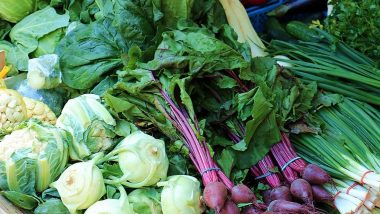In order to maintain good health, it is not just necessary to eat as per the required daily calorie intake, but it is also important to check whether the body is getting the required nutrients or not. Most people concentrate on macronutrients- carbohydrates, proteins and fats - but they forgo the micronutrients which are vitamins and minerals. One such micronutrient is Vitamin A, which is important for the body. Let's take a look at the health benefits of vitamin A along with five foods which you should eat to source this micronutrient. Vitamin F Health Benefits: Here's Why You Must Include This Essential Nutrient in Your Diet.
Health Benefits of Vitamin A
1. Vitamin A intake is necessary for good eyesight and the deficiency of this nutrient can lead to night blindness.
2. Vitamin A helps in the production of white blood cells, which clear bacteria and other pathogens from the bloodstream. This, in turn, can help in strengthening the body's immunity.
3. In order to have good skin, make sure to eat an adequate amount of vitamin A, as this nutrient helps in the production of sebum, the oil responsible to maintain levels of moisture in the skin and hair. Magnesium Deficiency Affects Your Performance During Intense Workout Session; Know What Food to Consume For Sufficient Magnesium Intake.
4. Eating foods rich in vitamin A can make your bones strong and reduce chances of fracture.
5. Pregnant women should make sure they intake the required amount of vitamin A, as this nutrient can contribute to the healthy development of babies during pregnancy.
Five Best Foods For Vitamin A
1. Spinach

As per the National Institute of Health, half-cup of boiled spinach provides 573 mcg of vitamin A, which is 229 percent of recommended dietary intake (RDI).
2. Red Bell Peppers

Red Bell peppers are a good source of antioxidants capsanthin which have anti-inflammatory and antihistamine properties. Half a cup of raw red bell pepper provides a 117 mcg of vitamin A, which is 47 percent of the daily required value.
3. Broccoli

Apart from being rich in vitamin C and K, broccoli also consists of a good amount of vitamin A. As per the data of the National Institute of Health, half-cup of broccoli provides 60 mcg of vitamin A, which is 24 percent of RDI.
4. Muskmelon

Half cup of muskmelon provides 135 mcg of vitamin A, which is 54 percent of the daily required value. It is also rich in vitamin C which is good for immune system.
5. Dried Apricots

Dried apricots contain a decent amount of vitamin A and are also high in fibres and antioxidants. However, they are a bit high in calories, so eat it in moderation.
Therefore, just like vitamin C, iron, potassium, vitamin A is also a vital micronutrient for the body. As per the Department of Health and Human Services in the United States of America, vitamin A intake for men should be 900 mcg, for women 700 mcg while for children and adolescents it is 300–600 mcg. Consult your dietician for proper intake of all essential nutrients in proper proportion.
(This article is written for an informative purpose and should not be substituted for medical advice. Kindly consult your doctor before trying any tips.)
(The above story first appeared on LatestLY on May 23, 2020 06:26 PM IST. For more news and updates on politics, world, sports, entertainment and lifestyle, log on to our website latestly.com).













 Quickly
Quickly


